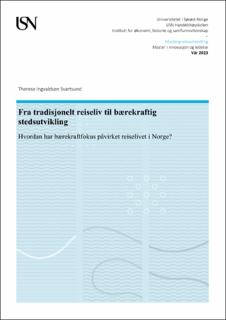| dc.contributor.advisor | Bentsen, Kristin | |
| dc.contributor.author | Svartsund, Therese Ingvaldsen | |
| dc.date.accessioned | 2023-07-06T16:41:56Z | |
| dc.date.available | 2023-07-06T16:41:56Z | |
| dc.date.issued | 2023 | |
| dc.identifier | no.usn:wiseflow:6825538:54951351 | |
| dc.identifier.uri | https://hdl.handle.net/11250/3076864 | |
| dc.description.abstract | Formålet med studien er å se på hvordan reiselivet i Norge har endret seg over en tidsperiode, gi et innblikk i noen bestemte utviklingsprosesser, og utforske samhandlingsmønstre som kan føre til innovasjon.
Det gis først et tilbakeblikk på et tradisjonelt servicebasert reiseliv der utvikling ble styrt gjennom hierarkiske strukturer, deretter presenteres en overgang til mer opplevelsesbaserte tjenester i destinasjoner og som forutsetter større åpenhet og innovasjon. Til sist bringes det inn et bærekraftfokus med nye premisser for innovasjon både i forretningsmodeller og strukturer for samarbeid. Målet har vært å få innsyn i ledelse av innovasjonsprosessene og skaffe ny innsikt om alternative modeller for samfunnsutvikling, særlig tilknyttet utvikling av reisemålene.
Studiens teoretiske rammeverk er utvalgte teorier innenfor åpen innovasjon og opplevelsesøkonomi i reiselivet, og det er i hovedsak lagt vekt på å studere utvikling av destinasjonsselskaper og destinasjonsledelse.
«Nasjonal reiselivsstrategi 2030: Sterke inntrykk med små avtrykk» er reiselivets strategidokument for en bærekraftig omstilling av næringen i tråd med FNs bærekraftmål. Dokumentet vektlegger samarbeid og samhandling med næringens omgivelser som et viktig premiss for å lykkes, og har vært forutsetning for studien.
Primærdata er samlet gjennom kvalitative dybdeintervjuer med ni personer som har representert fire destinasjonsselskaper/turistkontor og tre andre aktører med virksomhet beslektet med reiselivet. Det har i tillegg vært innhentet sekundærdata som rapporter, plandokumenter, møtereferater og internettsider i forbindelse med forberedelse til intervjuene, og for utdyping og validering av informasjonen fra intervjuene.
Funnene avdekker at reiselivsnæringens aktører ønsker sterkere samarbeid og samhandling med parter utenfor næringen, både med offentlige aktører, andre næringer og bransjer, og med innbyggere. Destinasjonsselskapene tar en tydelig ledende rolle for å få til ny og mer bærekraftig utvikling av hele reiselivet i tråd med den overordnede reiselivsstrategien.
Nøkkelord: innovasjonsprosesser, økosystem, innovasjon i reiseliv, destinasjonsledelse, bærekraftig samfunnsutvikling | |
| dc.description.abstract | The purpose of the study is to look at how tourism in Norway has changed over a period of time, provide an insight into some specific development processes, and explore interaction patterns that can lead to innovation.
It first gives a look back at a traditional service-based tourism where development was managed through hierarchical structures, then a transition to more experience-based services is presented in destinations and require greater openness and innovation. Finally, a sustainability focus with new premises for innovation in both business models and structures for collaboration is introduced. The aim has been to gain insight into the management of innovation processes and obtain new insights on alternative models for societal development, especially related to the development of destinations.
The study's theoretical framework is selected theories within open innovation and economy in adventure tourism, and emphasis is mainly placed on studying the development of destination companies and destination management.
"National tourism strategy 2030: Strong impressions with small footprints" is the tourism industry's strategy document for a sustainable restructuring of tourism in line with the UN Sustainable Development Goals. The document emphasises cooperation and interaction with the industry's surroundings as an important premise for success, and has been prerequisite for the study.
Primary data were collected through qualitative in-depth interviews with nine people who have represented four destination companies/tourist offices and three other actors with activities related to tourism. In addition, secondary data such as reports, planning documents, meeting minutes and Internet pages have been collected in connection with preparation for the interviews, and for elaboration and validation of the information from the interviews.
The findings reveal that the tourism industry's actors want stronger cooperation and interaction with others outside the industry, both with public actors, other industries, and with citizens. The destination companies are taking a clear leading role in bringing about a new and more sustainable development of the entire tourism industry in line with the overall tourism strategy. | |
| dc.language | nob | |
| dc.publisher | University of South-Eastern Norway | |
| dc.title | Fra tradisjonelt reiseliv til bærekraftig stedsutvikling : Hvordan har bærekraftfokus påvirket reiselivet i Norge? | |
| dc.type | Master thesis | |
